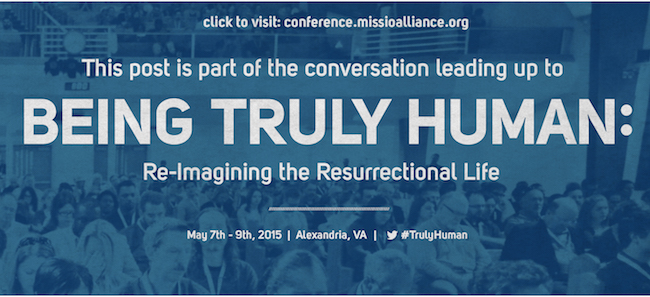Becoming #TrulyHuman: I Tremble at the Thought of Belief
I tremble at the thought of belief. To look past our opinions and passing thoughts and to explore our beliefs, the ones nestled deep in our hearts, is to see the hidden secrets forming our identity as human beings. To believe is to be human.
It is not only religious people who subscribe to certain beliefs. We work in vain when we attempt to divide people into two groups: believers and non-believers. Religious groups often employ the language of “non-believers” to describe those who do not subscribe to their specific moral/religious code. In doing so, they create a false category. There are no non-believers in the human family. We are all believers in the sense that we all live, move, and have our being in some kind of system of beliefs.
We may not all believe the same things, certainly not. Many of the struggles within human society erupt when our alternative beliefs come into direct conflict with one another. History is full of stories of clashes between groups who vehemently disagree on issues of politics, religion, social norms, education, art, etc. None of us can rightly be called “non-believers” as if we believe nothing and doubt everything. Even those who are known primarily for expressing doubts are believers of one kind or another, because every doubt is based on an alternative belief. (I am indebted to Tim Keller for the concept of doubt as an alternative belief. See Timothy Keller, The Reason for God (New York: Dutton, 2008).
While our beliefs may be expressed verbally leading too often to conflict when faced with a contradictory belief, they find their home in our hearts. To be a living, walking, feeling, loving, thinking person implies the presence of a certain set of deep-rooted, core beliefs. These beliefs define who we are; they give us a since of identity. Our beliefs order our values by establishing priorities in our lives. Our beliefs shape our worldview, that is how we view life, God, relationships, and reality. They guide our reasoning and ability to think, influence our decision-making, and dictate how we treat other people. This is why I tremble at the thought of belief.
Our beliefs form us into who we are becoming. This is not say that we can be anything we want to be if only we “believe in ourselves.” I cannot become a professional basketball player, simply because I believe I am a pretty good athlete. Such dreams are the substance of childhood wishes, which have their place in a child’s imagination. Wishes are good, but they do not have the same power as beliefs. A belief is a deep-seated conviction. If our beliefs are not grounded in reality, then we become distorted human beings. Imagine an awkward adolescent who dreams of a career playing professional basketball and believes they are the next coming of Magic Johnson, Michael Jordan, or LeBron James, when in reality he lacks the skills to even make school team. His mistaken belief will lead to embarrassment, failure, defeat. This is why I tremble at the thought of belief.
Enter Jesus of Nazareth. Into a world of conflicting beliefs comes the son of a carpenter who is heralded as a prophet. He proclaims the goodness of God’s kingdom. He heals the sick. He challenges the religious establishment and breaks social norms. He turns water into wine and walks on water. He teaches. He shows people a new way to live, a new way of living in right relationship with God, a new way of believing in God. He is celebrated, talked about and betrayed. He is arrested, tried, sentenced, executed. He dies a gruesome, horrific death, but not until he cried out in a breathless prayer: Father forgive them, for they know not what they do.
He died. He is buried and then…silence, a day of mourning and despair by those who loved him and gave up everything to follow him. Then on the first day of the week, life overcomes death. Resurrection. Conversation. Ascension. The fledgling group of Jesus follow watches in disbelief as he dies and they experience a new kind of belief when they talk to him alive and resurrected. This new belief, this Christian belief, enters the conversation to challenge every other system of belief, which in turn challenges everything in our lives and in human relationships.
The Jesus followers said goodbye to God in the flesh, they waited eagerly for the Helper, the God-like-a-dove, the promised Holy Spirit. As they celebrated the Jewish Passover, the Holy Spirit entered the house where they had gathered with power of gale force winds. These early Christians were overwhelmed by the Spirit, speaking in new languages they spilled out into the streets of the Roman world declaring the truth of the resurrection of Jesus. As three thousand new people entered into the community of forgiven, the Bible notes that the life of this new community was formed by devotion to four things: the apostles’ teaching, the fellowship, the breaking of bread, and the prayers (Acts 2:42).
As the divinely-inspired writers began the processes of penning what we know as the New Testament, the followers of Christ devoted themselves to the apostles’ teaching, the teaching of the original followers of Jesus, those he called to be disciples or apostles. Their teaching was quickly summed up into a memorable set of statements known today as the “the Apostles’ Creed.” This creed became the early symbol of the Christian faith. As a symbol it served as the very DNA of the faith, containing within it the basic building blocks not only of Christian living but human living.
To believe is to be human, but to be truly human is to believe, and be transformed, by these things.
—
Taken from Chapter 1 of Primal Credo by Derek Vreeland. Used by Permission.
[Photo by Roland Tanglao]
